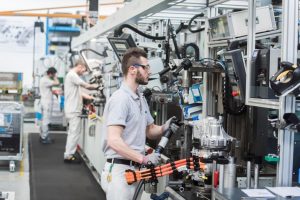Midlands Engine fired up as £1.1bn devolution deal agreed

THE Government will today sign off on a £1.1bn devolution deal for the West Midlands which will see the region control its own destiny in key areas linked to economic growth.
The deal is the largest devolution finance package handed down to date by the Government but it is dependent on the area electing a ‘metro mayor’ to oversee the West Midlands Combined Authority by 2017.
Chancellor George Osborne will be in Coventry today to sign off the deal which will see the region receive about £36m a year over 30 years to create a fund that would be used to bring in private sector investment. Other areas have received £30m but the West Midlands successfully argued that its size – covering an area that could expand to 4m people and an economy worth £80bn annually – merited the extra cash.
The area will also receive an additional £97m for a further extension of the Midland Metro tramline, possibly the branch linking up Birmingham city centre and Eastside, where the HS2 terminal is to be built.
Osborne said: “We want to make the Midlands Britain’s engine for growth, and this deal will give the region the powerful levers it needs to make that happen.
“We have worked with local council leaders across the party divide, and today we are announcing a collaborative way of working that would not have been countenanced in this region even just a few years ago.”
The West Midlands Combined Authority – made up of local authorities including those controlling Birmingham, Solihull, Coventry and the Black Country as well as local enterprise partnerships – will gain powers over policing, skills, business support and transport.
However, it will not get the right to take charge of the M6 Toll, which was widely suggested to be one of its ambitions.
But the Government has promised to support plans to help the region make the most of the planned HS2 high-speed rail line. Proposals include expanding the business district in Eastside.
A mayor will chair the West Midlands Combined Authority but would also have some influence over towns in Warwickshire, Staffordshire, Shropshire and Worcestershire which are not full members of the new authority.
Birmingham voters rejected the idea of having a city mayor in a referendum in 2012 but the Government insists that the devolution package is dependent on a metro mayor being elected to oversee the combined authority.
Reaction to the deal from business leaders in the West Midlands has been positive.
Andy Street, chairman of the Greater Birmingham & Solihull Local Enterprise Partnership, said: The announcement today of a West Midlands Devolution Deal is hugely welcome. Building on the collaboration demonstrated by the Greater Birmingham & Solihull, Black Country and Coventry & Warwickshire Local Enterprise Partnerships it reflects genuine teamwork between Government, the local authorities and business.
“It has many impressive features, among which confirmation that the city centre Enterprise Zone will be extended around the Curzon St HS2 terminal is important. The proposed deal will also support the delivery of the wider HS2 Growth Strategy, critical to realising all the benefits of this once in a generation investment.
“Critically, the deal will not just support infrastructure but also seek to address key supply-side elements of the economy: improving skills levels through the devolution of 19+ adults skills funding, enhancing business support through a new devolved approach and delivering a more integrated model for investment and trade.
“Taken together, this deal will support the West Midlands to maximise its areas of strength and address its challenges, so having a major impact on the local economy and cementing our leadership of the national recovery.”
Greater Birmingham Chambers of Commerce of Commerce (GBCC) said it was ready to offer the support of the private business sector and to ensure that “this epoch-making” agreement was a “huge success” for the region.
It added that it was now imperative that the new region attracted the right candidates to compete for the role of elected mayor.
Paul Faulkner, chief executive of the GBCC, said: “This a hugely significant step in the evolution of the West Midlands and one in which the business community is ready to throw its full weight in support.
“It’s often said that business is not restricted by local authority boundary lines and this deal offers the WMCA Councils a chance to deliver joined up strategy and activity that reflects the real economy of the area.
“The WMCA is explicitly focused on facilitating the healthy growth of the regional economy through improved skills provision, transport links and homes. Along with the powers announced today, a WMCA “Metro Mayor” will have the power to add a premium onto business rates in order to fund infrastructure projects, under plans announced by George Osborne earlier this year.
“It is imperative that we now work to ensuring that the people of the WMCA have a selection of outstanding candidates to elect into the role of mayor.”
Louise Bennett, chief executive of the Coventry and Warwickshire Chamber of Commerce, said: “The businesses of Coventry and, indeed, Warwickshire don’t look at city, county, regional or even national borders as a barrier to do business.
“They simply want the city and the region to have the best possible conditions from which to do business and if a regional combined authority can help to do that by drawing down further investment then business will welcome the move.
“Coventry has made the bold step of going into the combined authority and they will have this Chamber’s support in any bid to attract investment to the city that can have a positive knock-on effect for the entire region.”









